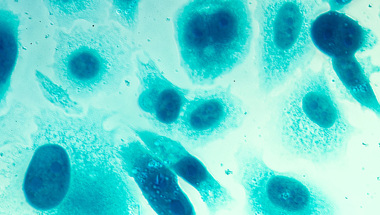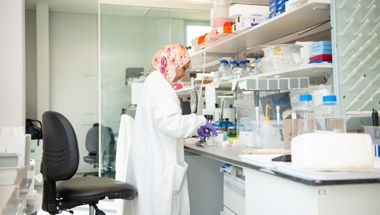
Targeting the fat around the prostate to better treat prostate cancer

Grant information
Reference: RIA23-ST2-016
Lead researcher: Dr Claire Fletcher
Institution: Imperial College London
Award: £526,593
What you need to know
- This research explores how fat around the prostate can fuel cancer growth, especially in obese men.
- The team aims to identify which substances from fat help cancer grow and how cancer cells change in response to fat.
- This could lead to a way to spot which men are most at risk of dying from prostate cancer, as well as new treatments that improve survival rates by blocking harmful interactions between fat and cancer cells.
Why are we funding this research?
This research comes at a crucial time when both prostate cancer and obesity are on the rise. Research has found that men who have more fat around their prostates are less likely to respond to treatment and more likely to die from the disease. What’s more, weight gain is a common side effect of hormone therapy, the most common treatment for prostate cancer.
Despite this, we know very little about how fat around the prostate influences cancer growth at a molecular level. Understanding this connection is vital if we want to give men the best chance of responding to their treatment.
What will the researchers do?
The team will collect fat from around the prostates of men who are having their prostates removed due to cancer. They will also take samples from mice that develop prostate cancer. This will help them study how fat interacts with cancer cells.
Once they have the fat samples, the team will grow this fat in the laboratory. This allows them to collect and analyse the substances (like fats and sugars) that the fat cells release and that may help cancer cells grow and spread. They will also expose cancer cells to these fat cells for six months, to mimic the long-term exposure of fat to cancer cells in the body and see how the cancer cells change over time.
Using a technique called mass spectrometry, the researchers will find which specific substances from the fat are transferred to the cancer cells. They will also see if these substances are different in obese men compared to men of a healthy weight.
The team will then examine how these substances affect the behaviour of prostate cancer cells. They want to understand how these substances help cancer cells grow, spread to other parts of the body, and hide from the immune system.
Finally, the researchers will create a detailed map of how fat around the prostate changes as cancer progresses. This map will show how cancer cells reprogram the surrounding fat to support their growth.
This research aims to understand why obese men face more aggressive prostate cancer, potentially leading to new treatments and better ways to identify men at greatest risk. Receiving this Prostate Cancer UK Research Innovation Award is crucial for expanding my research team and building a global reputation in obesity-driven prostate cancer research. It also gives me the exciting opportunity to train the next generation of research leaders, including a PhD student and post-doctoral researcher.
How will this benefit men?
By understanding how fat around the prostate helps cancer grow, the researchers could find new ways to spot which men are most at risk of developing prostate cancer that needs aggressive treatment.
The research could also lead to new treatments that specifically target these interactions. This could lead to more effective therapies that improve survival rates for men with prostate cancer. This could be particularly beneficial for men who are obese, as they’re currently less likely to respond to treatment.
Help us fund more research like this
Your donation helps us fund lifesaving research into better treatments for prostate cancer.




